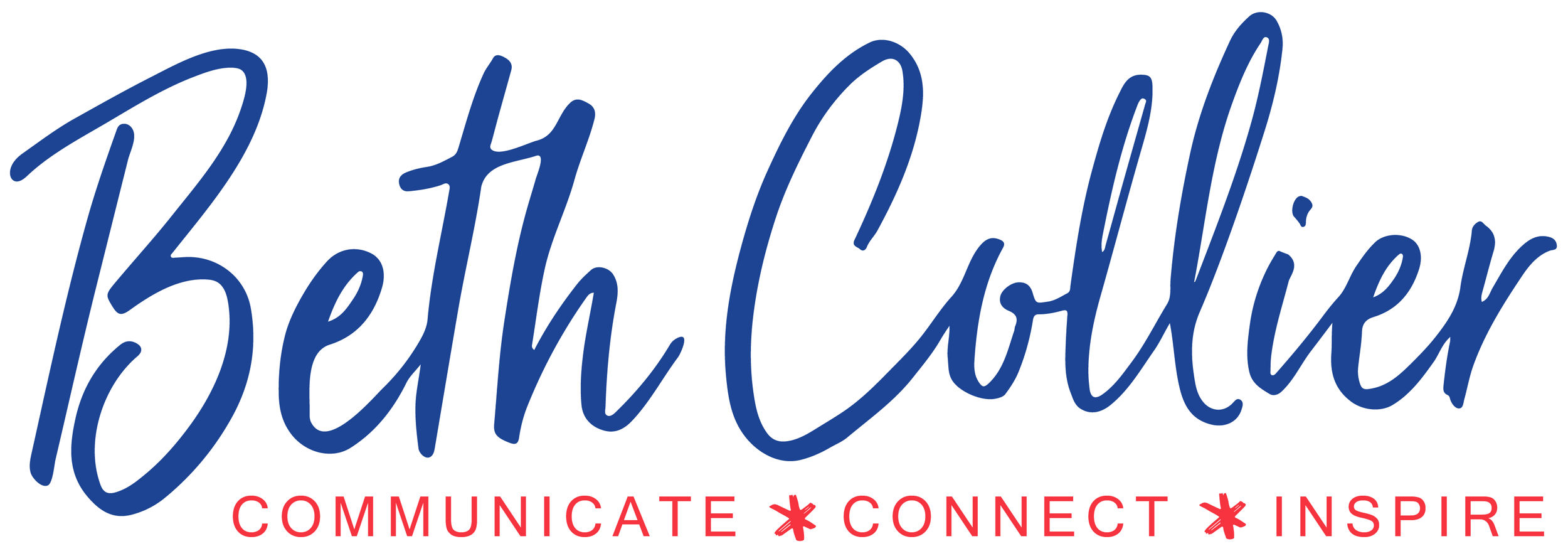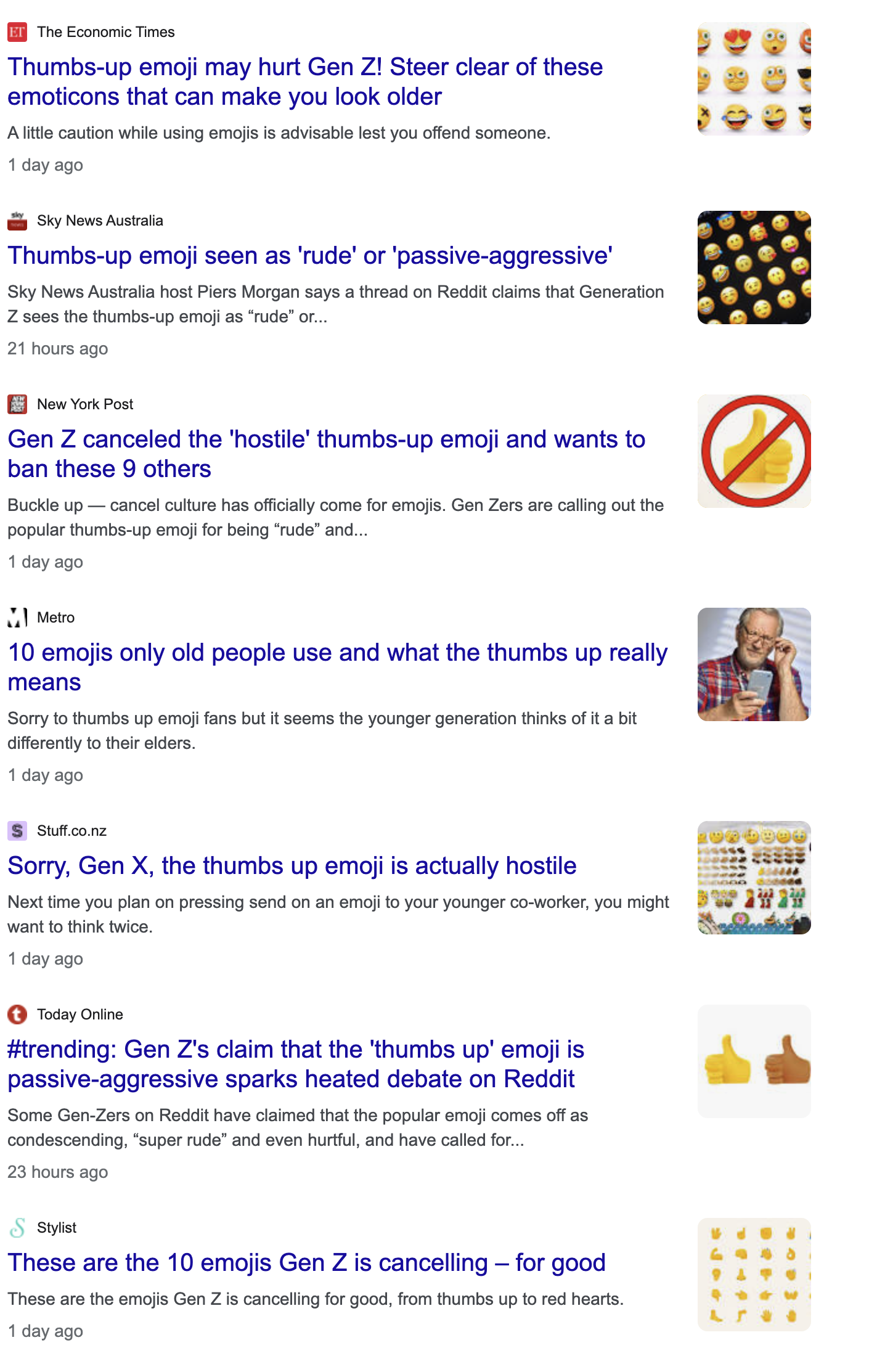The Thumbs Up Emoji Does Not Make You Look Old
Sometimes I hear or read something and it just sticks with me.
This week, I was thinking about an anecdote I heard months ago on a podcast about Lee Clow, an advertising legend.
CEO of TBWA\Chiat\Day New York Nancy Reyes shared a story about how, years ago, Lee had sent her an email with a thumbs up emoji when she was promoted at the agency where they worked.
The recognition from Lee clearly meant a lot to her, as she shared that she took a picture of the email, and sent it to her husband and friends.
It was a simple act of kindness and support from someone whose opinion mattered to her.
And it was a great example of how leaders being decent human beings has an effect on people.
Based on my experiences supporting leaders with their communication (and having ghostwritten more than a few congratulatory notes over the years), I know how much small gestures of recognition mean to people.
I decided to record a video and share the story about Nancy and Lee, making the point that we can all take a few minutes to be kind, and recognize and appreciate our colleagues.
I finished recording the video and sent it away for captions..
Several hours later, I saw a trending topic on twitter.
“Gen-Zers say they feel attacked whenever they see a ‘passive aggressive’ thumbs-up emoji”
WHAT?
I posted my video on LinkedIn the next day, and wondered if someone would link my message to the story about the thumbs up emoji.
Yep.
Of course, I wasn’t saying we should all go around sharing thumbs up emojis. I’m partial to a good handwritten note (with bonus points if it’s on personalized stationery).
But the headline of the article made me curious.
And if you read Curious Minds, you know what that means…
I went down the rabbit hole.
Gen Z is a big group of people. Is a whole generation really that offended by an emoji?
And if they were to choose one emoji to target, would it be the thumbs up?
Well, the story took off, and here are some of the headlines:
And I’m not happy about it, but to do proper research, I had to click on a story in the Daily Mail, where in paragraph three I learned that the source of this news-breaking story was…
“A 24-year-old on Reddit.”
Or, let’s be specific – someone claiming to be a 24-year-old.
On an “Adulting” forum.
I clicked on the Reddit hyperlink in the Daily Mail story, but it did not take me to the Reddit thread. But being the resourceful gal that I am, I found it.
And when was this claim made?
Ten months ago.
This is not news.
[Ed – there has been significant activity on this forum since the original articles were shared. If you read the posts, you can see there was minimal activity when the comment was first posted.]
Among the original thread were people defending the thumbs up emoji and questioning why it wasn’t OK, but the heart emoji was.
And then there was this person, who offered another point of view.
But why let facts get in the way of a good story?
The New York Post also shared the story, taking it a step further with an article that began:
“Buckle up – cancel culture has officially come for emojis.”
Really?
In an attempt to give a Reddit post wings, their article (and others, including the Daily Mail) referenced a survey of 2000 people conducted by Perspectus Global that said you were “officially old” if you use the thumbs up or heart emoji.
No article I’ve found has actually shared who was surveyed or why, or any specific details about the research, and I can’t find details on the Perspectus Global website either (though I have emailed them and asked for details on their research).
Oh, and the media outlets sharing this have neglected to mention that these “findings” are not recent – they were shared in an article in April 2021.
Again, not breaking news.
But that hasn’t stopped Fox News and others from picking this up as the latest example of how ridiculous Gen Z is, and how cancel culture is out of control.
But if one anonymous person’s opinion on Reddit is newsworthy, then let me share mine:
If you are a member of Gen X or the Baby Boomer generation and you use the thumbs up emoji, rest assured – it doesn’t make you old.
Being born before 1980 makes you old. Or at least, older.
And please don’t take offense, it makes me old, too.
I have a wonderful 25-year-old friend, and our generational divide provides lots of entertainment.
But it’s not our use of emojis that reinforces our age difference – it’s our reference points, and our life experiences.
And do you know what’s worse than a 45-year-old appearing old?
A 45-year-old trying to appear young.
And why are people writing articles pitting us against each other?
Sure our generations are different, but we also have a lot in common.
We Gen Xers were called lazy slackers 20 years ago.
Now we’re regarded as a generation of hard workers.
In 20 years, the news will be Gen Z complaining about Gen Beta.
So, as someone who helps people improve their communication for a living, here’s my 2 cents:
When it comes to emojis, it’s just like any type of communication.
Know your audience.
Communicate in a way that is appropriate for — and will resonate with — them.
Some people will like seeing an applause emoji.
Other people want to see the words “Great job” instead.
And when you see articles like this that aim to divide us, maybe dig a little bit deeper.
And before you get outraged, get curious.
***********************************************************
Beth Collier loves writing, pop culture, and the winking emoji. ;-)
She also loves helping companies, leaders, and teams improve their communication (and creativity and leadership) through consulting, coaching, and workshops.
Her clients benefit from Beth’s global corporate experience, Midwestern practicality and enthusiasm, and an endless supply of pop culture references.
To find out how Beth can help you become a more confident, creative, and compelling leader – or improve communication in your company – visit www.beth-collier.com or drop her a line at beth@beth-collier.com






